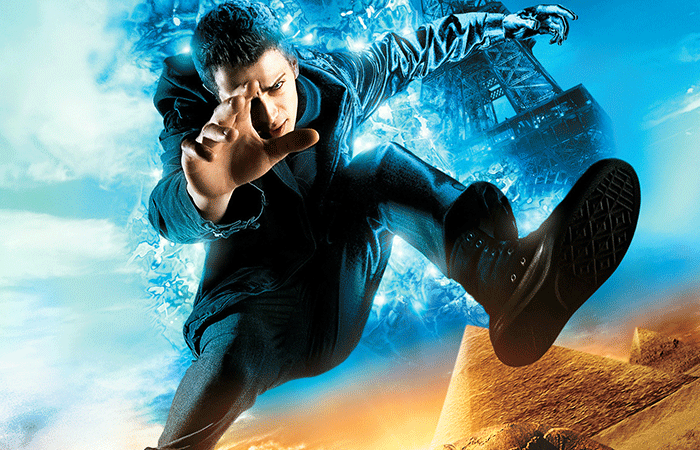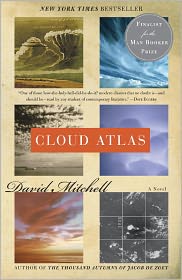6 Awesome Science Fiction Books Behind Box Office Flops
 I love science fiction books. I love science fiction movies. But somehow, the two don’t always blend well.
I love science fiction books. I love science fiction movies. But somehow, the two don’t always blend well.
While a lot of stunning fiction adaptations are in the works, particularly for the silver screen, Hollywood’s track record of turning classic science fiction or fantasy novels into box office money makers is a little spotted.
Now that mass audiences are starting to appreciate the weirdness of science fiction a little more (WITNESS ME, Mad Max: Fury Road!), we might see that record improve. Until then, though, here’s a look at the best SF/F fiction that turned into the biggest commercial failures.
John Carter of Mars, Volume One: A Princess of Mars, The Gods of Mars, The Warlord of Mars
John Carter of Mars, Volume One: A Princess of Mars, The Gods of Mars, The Warlord of Mars
By
Edgar Rice Burroughs
Introduction
Brian Stableford
Paperback $14.95
A Princess of Mars, by Edgar Rice Burroughs
2012’s Mars-based space opera John Carter was based on the first in the Barsoom novels, written by Edgar Rice Burroughs during the first half of the 20th century. The book is a pulpy science-fantasy action-adventure featuring monster battles, extraplanetary civil wars, and alien princesses. The film actually captured the spirit of the story perfectly, but by the time it was made, plenty of bigger hits (ever heard of Star Wars?) had stolen the best bits. Poor marketing hurt too, and the film earned back just $284 million of a hefty $350 million budget.
A Princess of Mars, by Edgar Rice Burroughs
2012’s Mars-based space opera John Carter was based on the first in the Barsoom novels, written by Edgar Rice Burroughs during the first half of the 20th century. The book is a pulpy science-fantasy action-adventure featuring monster battles, extraplanetary civil wars, and alien princesses. The film actually captured the spirit of the story perfectly, but by the time it was made, plenty of bigger hits (ever heard of Star Wars?) had stolen the best bits. Poor marketing hurt too, and the film earned back just $284 million of a hefty $350 million budget.
Judge Dredd Complete Case Files : The Complete Case Files
Judge Dredd Complete Case Files : The Complete Case Files
By John Wagner , Malcolm Shaw , Joe Collins
Paperback $31.05
Judge Dredd, by John Wagner
Judge Dredd is a comic book character policing an overrun future city in the 2100s, wielding the power of judge, jury, and executioner all in one. Wagner invented him as an ironic, hyper-violent version of the popular ‘tough cop’ of the ’70s, a helmet-faced supercop constantly running to and from explosive acts of machismo. That seems like a perfect fit for Sylvester Stallone during the 1990s, when Judge Dredd made it to the big screen. Sadly, the irony was lost in translation, along with the audience. Pick up Judge Dredd if you’re nostalgic for cheesy ’90s films, pick up the reboot (also a box office under-performer) if you want the best cinematic take on the gritty material, and pick up the original comics for a fun sci-fi read.
Judge Dredd, by John Wagner
Judge Dredd is a comic book character policing an overrun future city in the 2100s, wielding the power of judge, jury, and executioner all in one. Wagner invented him as an ironic, hyper-violent version of the popular ‘tough cop’ of the ’70s, a helmet-faced supercop constantly running to and from explosive acts of machismo. That seems like a perfect fit for Sylvester Stallone during the 1990s, when Judge Dredd made it to the big screen. Sadly, the irony was lost in translation, along with the audience. Pick up Judge Dredd if you’re nostalgic for cheesy ’90s films, pick up the reboot (also a box office under-performer) if you want the best cinematic take on the gritty material, and pick up the original comics for a fun sci-fi read.
Jumper (Jumper Series #1)
Jumper (Jumper Series #1)
By Steven Gould
Paperback $15.99
Jumper, by Steven Gould
Gould’s 1992 novel is a touching coming-of-age story that happens to be about a teenager who realizes he can teleport. Naturally, he uses it to leave his abusive father and start robbing banks. The entire story is a young-adult classic, and a remarkably engaging read. The film version took the concept of teleportation, removed the novel’s entire plot, and replaced it with an overly complex conspiracy of religious cultists intent on killing all teleporters for no good reason. And Hayden Christensen starred. I’ll say no more. The pricey film managed less than $100 million in the U.S.; despite a decent international take, the planned sequel never materialized.
Jumper, by Steven Gould
Gould’s 1992 novel is a touching coming-of-age story that happens to be about a teenager who realizes he can teleport. Naturally, he uses it to leave his abusive father and start robbing banks. The entire story is a young-adult classic, and a remarkably engaging read. The film version took the concept of teleportation, removed the novel’s entire plot, and replaced it with an overly complex conspiracy of religious cultists intent on killing all teleporters for no good reason. And Hayden Christensen starred. I’ll say no more. The pricey film managed less than $100 million in the U.S.; despite a decent international take, the planned sequel never materialized.
Cloud Atlas
Cloud Atlas
By P. K. Meyer
In Stock Online
Paperback $17.00
Cloud Atlas, by David Mitchell
Let no one claim the Wachowski siblings aren’t ambitious: in 2012, they adapted the nigh-unadaptable, bizarrely structured, multi-genre, liked-novella “novel” Cloud Atlas. David Mitchell’s book features six different stories nested within each other—stories set in the past, present, and future, which interrupt one-another midstream in a stair-stepping pyramid structure, then climb back down, offering their endings as the book travels backward to revisit each timeline. The novel won the British Book Awards’ Literary Fiction Award and was the Richard & Judy Book of the Year, but a rejiggered, constantly intercutting structure proved to be polarizing on film, and meager box office earnings have relegated the adaptation to cult classic status.
Cloud Atlas, by David Mitchell
Let no one claim the Wachowski siblings aren’t ambitious: in 2012, they adapted the nigh-unadaptable, bizarrely structured, multi-genre, liked-novella “novel” Cloud Atlas. David Mitchell’s book features six different stories nested within each other—stories set in the past, present, and future, which interrupt one-another midstream in a stair-stepping pyramid structure, then climb back down, offering their endings as the book travels backward to revisit each timeline. The novel won the British Book Awards’ Literary Fiction Award and was the Richard & Judy Book of the Year, but a rejiggered, constantly intercutting structure proved to be polarizing on film, and meager box office earnings have relegated the adaptation to cult classic status.
Speed Racer: Mach Go Go Go Box Set
Speed Racer: Mach Go Go Go Box Set
By
Tatsuo Yoshida
Artist
Tatsuo Yoshida
Paperback $39.95
Mach GOGOGO, by Tatsuo Yoshida
First published as a manga and quickly adapted into an anime, Mach GOGOGO is an endearingly titled cartoon all about racing like a maniac. Ported over to America as Speed Racer, it became one of the States’ first big anime franchises, and spewed spin-offs and merchandise faster than a Mach 5 race car. Then the Wachowskis (again!) developed a 2008 film based off the property. Proving their knack for developing weird sci-fi projects that can’t quite convince an audience to fill seats, it flopped rather massively, returning $44 million in the U.S. against a $120 million budget (even in Speed’s home country of Japan, it flopped, collecting just $3.5 million).
Mach GOGOGO, by Tatsuo Yoshida
First published as a manga and quickly adapted into an anime, Mach GOGOGO is an endearingly titled cartoon all about racing like a maniac. Ported over to America as Speed Racer, it became one of the States’ first big anime franchises, and spewed spin-offs and merchandise faster than a Mach 5 race car. Then the Wachowskis (again!) developed a 2008 film based off the property. Proving their knack for developing weird sci-fi projects that can’t quite convince an audience to fill seats, it flopped rather massively, returning $44 million in the U.S. against a $120 million budget (even in Speed’s home country of Japan, it flopped, collecting just $3.5 million).
Do Androids Dream of Electric Sheep? (Blade Runner)
Do Androids Dream of Electric Sheep? (Blade Runner)
By
Philip K. Dick
Introduction
Roger Zelazny
In Stock Online
Paperback $16.00
Do Androids Dream of Electric Sheep? by Philip K. Dick
Classic science fiction author Philip K. Dick has had some bad luck with film adaptations. There are plenty of them—Minority Report, Total Recall, A Scanner Darkly, and The Adjustment Bureau, to name a few—but they seldom stick to Dick’s odd plotlines. Ridley Scott’s Blade Runner was no exception. And, as hard as it may be to believe now, the revered sci-fi thriller flopped hard in the summer of 1982. Harrison Ford starring as Rick Deckard, a bounty hunter tracking rogue humaniod replicants through neo-noir Los Angeles? How could it lose? Well, pitting a dark-as-night noir against the warm-hearted ET: The Extraterrestrial was probably the first mistake. Scott’s film grossed a million under its $28 million budget. But all was not lost: VHS developed as a technology just in time for audiences to realize that the film is very rewatchable, particularly after the director released two alternate cuts, each with a higher concentration of creative freedom than the last.
(Sadly, they cut Deckard’s titular pet artificial sheep from the film. Maybe it can appear in the sequel.)
Do Androids Dream of Electric Sheep? by Philip K. Dick
Classic science fiction author Philip K. Dick has had some bad luck with film adaptations. There are plenty of them—Minority Report, Total Recall, A Scanner Darkly, and The Adjustment Bureau, to name a few—but they seldom stick to Dick’s odd plotlines. Ridley Scott’s Blade Runner was no exception. And, as hard as it may be to believe now, the revered sci-fi thriller flopped hard in the summer of 1982. Harrison Ford starring as Rick Deckard, a bounty hunter tracking rogue humaniod replicants through neo-noir Los Angeles? How could it lose? Well, pitting a dark-as-night noir against the warm-hearted ET: The Extraterrestrial was probably the first mistake. Scott’s film grossed a million under its $28 million budget. But all was not lost: VHS developed as a technology just in time for audiences to realize that the film is very rewatchable, particularly after the director released two alternate cuts, each with a higher concentration of creative freedom than the last.
(Sadly, they cut Deckard’s titular pet artificial sheep from the film. Maybe it can appear in the sequel.)





